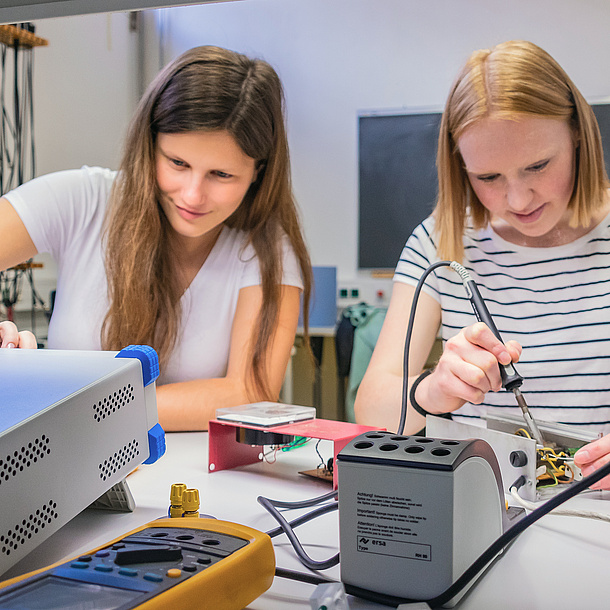- Duration of study: 6 semesters
- ECTS credit points: 180
- Academic degree: Bachelor of Science (BSc)
- Language of instruction: German
The Bachelor's Programme
In the Bachelor's Degree Programme Electrical and Electronics Engineering, you will learn the fundamentals and methods of electrical engineering as well as gain basic scientific knowledge. You will measure and program and increase your understanding of the content you learn in laboratory internships and applied work. As part of your training, you have the opportunity to begin specialising in a subject area of electrical engineering and information technology.
The students have access to excellent laboratory and technical infrastructure. This includes
- the Nikola Tesla Laboratory, where investigations and tests are carried out in the entire field of high voltage engineering,
- an anechoic chamber where, for example, electromagnetic compatibility measurements are made or
- an extreme climate chamber with capacities of up to 170 kV and temperature ranges from -40°C to +80°C.
In addition to the fundamentals of electrical engineering, information and communication technology, electronics and energy technology along with relevant mathematics, students also acquire soft skills and basic knowledge in the area of sustainability. In particular, sustainable digitalisation and energy supply for society are a focal point.
Throughout the degree programme, theoretical knowledge is supplemented with interesting opportunities to take a closer look at real-life applications. In guest lectures and courses, experts from internationally renowned companies such as AVL, BMW and Bosch as well as institutions such as ETH Zurich give insights into state-of-the-art developments in the field.
You will also be actively supported by a dedicated team of Electrical Engineering Student Representatives as well as by learning communities such as the Dynamo Engineering Drawing Studio or the High-Voltage Drawing Studio.
Studying Electrical and Electronics Engineering
In this degree programme, you have the opportunity to pursue studies in the following areas:
Mathematics: You will learn basic mathematical concepts and methods, such as functions, integral calculations, differential equations and the fundamentals of probability theory. In addition, you will learn how to use MATLAB/Simulink to solve mathematical problems.
Fundamentals of the Natural Sciences and Technical Computer Science: Among other things, you will learn the fundamentals of physics, optics, the quantum nature of light and matter, and learn structured programming. You will learn more about the structure and function of computer systems and learn which essential tasks are performed by operating systems.
Fundamentals of Electrical Engineering: You will learn fundamental knowledge and methods in electrical engineering and apply them, e.g. direct and alternating current circuits, electromagnetic energy and energy storage. Among other things, you will learn the basic laws that apply to the electrostatic field and the electric current field.
Electrical Engineering and Information Engineering: You will deepen your knowledge of energy technology and gain an overview of the components of the energy supply system. You will master basic information about electronic circuit technology and learn how to perform an analysis of and dimensioning on circuits. You will learn more about electrical drive technology and power electronics as well as about the transmission of information using analogue and digital methods.
Signals and Systems: You will deepen your knowledge in, for example, the fundamentals of measurement technology and the design of analogue and digital measuring instruments. You can dimension measuring chains correctly and implement them practically. In addition, you will acquire the ability to apply sensor systems practically.
Sustainability and climate protection: The field of electrical and electronics engineering has the potential to contribute significantly to more energy-efficient use of our resources, to minimise greenhouse gas emissions and thus to create a more sustainable future. This topic is discussed in detail in numerous courses throughout the bachelor’s degree programme.
What will I have to do in the first semesters? How much practice can I expect? And what can I actually do with my degree when I've finished? Check what you expect!
A student and a lecturer will take time for all your questions and you will get to know TU Graz during on-site appointments. Up to 10 persons can participate at each date.
Contact: lse@tugraz.at
Students can choose to specialise in Electronic Systems for an in-depth education and training in the area of electronic systems. In addition to laboratory courses, students will simulate electronic circuits, design RF circuits and expand their programming skills.
Students can also specialise in Sustainable Energy Systems for an in-depth education in the areas of high-voltage technology, electrical systems and machines, and power electronics. They will receive the necessary practical training in laboratory courses.
For further specialisation, students must also choose one of the following elective modules:
- Digital Lab
- Networked Autonomous Systems
- Electronics
- Power Engineering
- Renewable Energy
- Communications Engineering
Electrical engineering is omnipresent in society, whether it is used in the transmission and distribution of electrical energy, the development of new energy sources, microelectronics that are as small as a fingernail or to test plant components under high voltage.
TU Graz expertise in the field of electrical engineering is even used in modern locomotives, in medical diagnostic technology, in weather radars and in space missions. For example, the first flying hardware and software laboratory – ESA’s CUBE-SAT under the technical direction of TU Graz – started its mission in December 2019.
TU Graz has established itself as an important research partner in the electronics industry:
- The establishment of the Silicon Austria Labs (SAL) Headquarters on the TU Graz Inffeldgasse campus.
- The start of the FFG qualification programme, which gives partners from the domestic electronics industry the chance to certify their personnel: InnoEBS.
- The development of the Cybersecurity Campus Graz together with the testing and certification company SGS. A research hub that addresses the topic of the security of our networked world.
- The opening of the research and development centre in the field of sensor technology and microelectronics: the "Electronics-Based Systems Building" at TU Graz.
Excellent cooperation with industry offers researchers, students and graduates many opportunities to develop their innovative abilities.
Admission
Requirements for admission to a bachelor's degree programme at TU Graz
Summer semester 2026
Admission period: 7 January to 5 February 2026
Winter semester 2026/27
Admission period: 6 July to 5 September 2026
Contact study@tugraz.at
Perspectives for Graduates
On the one hand, the bachelor's programme provides you with an introduction to scientific logic and working methods, which is required to enter a more advanced master's programme. On the other hand, the professional opportunities for graduates are very extensive due to the breadth of the bachelor's programme, which are supplemented by in-depth studies in many areas.
Electrical engineers work in research, development and production departments, in energy supply and telecommunications companies and in companies in the automotive sector.
- They conduct research and develop applications in the fields of electrical engineering and information technology.
- They plan and implement electrical engineering systems for machines, plants, or buildings.
- They work in specialist areas, such as automation and mechatronics, energy and circuit technology.
- They integrate electrical engineering solutions into social and economic areas.
After completing the bachelor's degree programme, you can enrol in the following master’s degree programmes withour further requirements:
- Advanced Materials Science
- Electrical and Electronics Engineering
- Electrical Engineering and Business
- Space Sciences and Earth from Space
- Information and Computer Engineering
Information on other master's degree programmes with requirements you can find on the respective pages for the master’s degree programmes.
In addition, the bachelor's degree offers you the opportunity to apply internationally for master's degree programmes.




